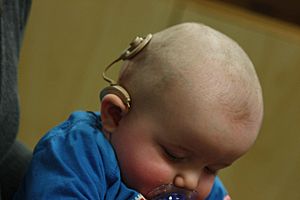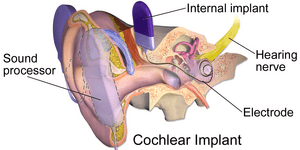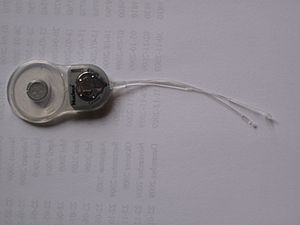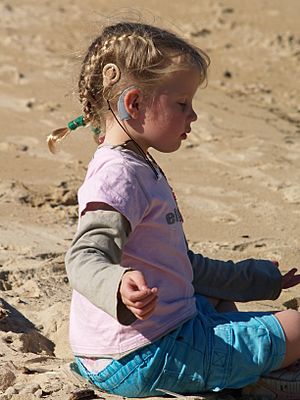Cochlear implant facts for kids
A cochlear implant (say "KOK-lee-er IM-plant") is a special electronic device. It helps people who have trouble hearing or are completely deaf. This device is put into a part of the ear called the cochlea through surgery. It helps them hear sounds better.
Not all parts of a cochlear implant are inside the ear. Some parts, like a microphone and other electronics, sit behind the ear. These outside parts send signals to the device inside the ear. This makes it possible for the person to hear.
Contents
How a Cochlear Implant Works
A cochlear implant has two main parts: external (outside the body) and internal (inside the body). Together, they help turn sounds into signals the brain can understand.
External Parts
The parts you can see or wear include:
- A microphone that picks up sounds from around you.
- A speech processor which is like a tiny computer. It takes the sounds from the microphone and makes them clearer, separating speech from background noise.
- A transmitter that sends the processed sound signals and power across your skin to the internal device. It uses a special way called electromagnetic induction to do this.
Internal Parts
These parts are placed inside your ear during surgery:
- A receiver/stimulator that gets the signals from the speech processor. It then changes these signals into tiny electrical pulses.
- An electrode array which is a thin wire with many small contacts. This wire is carefully placed inside the cochlea. The electrical pulses travel along this wire to stimulate the hearing nerve. This nerve then sends the signals to the brain, allowing the person to hear.
Cost and Support
Cochlear implants can be expensive. In 2017, the total cost in the United States was about $100,000. However, many people get help with the cost. Health insurance often pays for all or part of the implant.
In some countries, like the United Kingdom, Australia, Ireland, Spain, and Israel, the national health systems pay for the full cost of cochlear implants. In New Zealand, the Ministry of Health helps pay for new implants, depending on why someone has hearing loss. This support helps many people get the hearing help they need.
Images for kids
See also
 In Spanish: Implante coclear para niños
In Spanish: Implante coclear para niños
 | Precious Adams |
 | Lauren Anderson |
 | Janet Collins |






